All dogs experience gas from time to time. Some are gassier than others, but the occasional bout of flatulence is usually no cause for concern. Although it may be cause for opening a window!
We’ll explain everything you need to know below, including the primary causes of gas in dogs, the best ways to reduce the frequency of your dog’s farts, and when you should seek veterinary attention for your flatulent dog.
Reasons Your Dog Is Suddenly Gassy: Key Takeaways
- A moderate amount of gas is normal for dogs. Most mammals will expel gas from time to time, and your dog is no different. However, sudden changes in the quantity of your dog’s farts or the odor associated with them may be cause for concern.
- There are a variety of things that can cause excess gas in your pooch. Swallowing air, eating greasy or high-fiber foods, and minor stomach bugs are a few of the most common causes, but serious issues, including things like gastrointestinal tumors — can also cause sudden or unusual flatulence.
- You’ll want to see your vet if your dog’s excess gas production lasts more than a few days or is associated with other symptoms. Your vet can help identify the cause, determine its severity, and recommend a prudent treatment, if necessary.
Why Your Dog May Have Gas: Three Fundamental Reasons
There are a million specific things that may cause dogs to suffer from gas, but almost each and every one falls under one of three fundamental umbrellas.
We’ll discuss each of these three categories – and some of the best solutions to them — below.
1. Swallowing Excess Air
Many dogs suffer from gas for the same reason many people do: They inadvertently swallow a lot of air. When humans suffer this problem, it is usually because they’ve consumed a lot of carbonated beverages, chewed gum all morning, or developed the nervous habit of subconsciously swallowing air.
When dogs do it, it’s usually the result of eating too quickly.
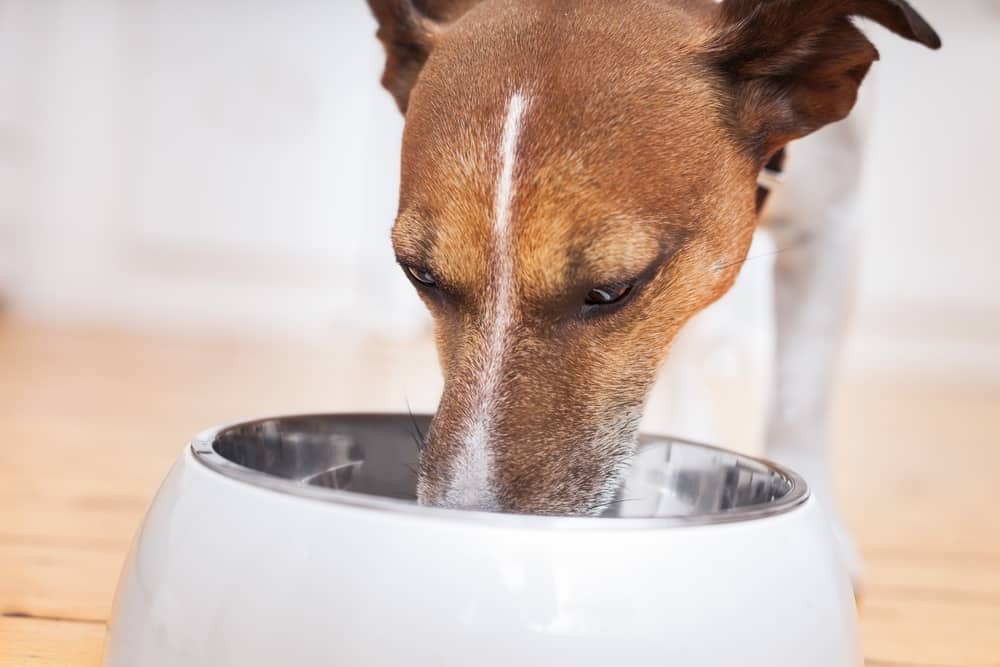
This is especially true of dogs who gulp their food at warp speed or eat right after exercising. But other dogs – particularly nervous individuals – can end up swallowing air no matter how slowly they eat.
Dogs can end up swallowing a lot of air for other reasons too.
Brachycephalic breeds, such as bulldogs, pugs, and others with short faces, often swallow a lot of air as a side-effect of their unusual anatomy. Some other dogs may swallow air due to the presence of respiratory diseases.
Potential Solutions:
- Use a feeding dish designed to slow your dog down at meal times. Slow feed dog dishes can stop your dog from inhaling his dog food the minute you set the kibble bowl down. If your dog eats slower, he’ll likely swallow less air, which will decrease the amount of air he has to expel.
- Feed your dog multiple small meals, rather than one large meal each day (this is actually good advice for most dogs). If you feed your dog only once per day, he’ll likely be ravenous during meal times, which will cause him to slurp up his food as fast as he can. But if you spread out his daily caloric allotment, he won’t be famished when he feasts.
- Do everything you can to soothe stressed or anxious pups. There are a variety of ways to relax a nervous pooch, but some of the most effective solutions include providing more exercise, setting your dog up with a cozy crate, giving your dog fun things to do while you’re away to prevent boredom, and fitting your pet with an anxiety-reducing tight-fitting garment.
2. Diet
The foods your dog eats can also cause your dog to suffer from gas. In some cases, gas is due to the ingredients present in the food, but it can also be a reflection of the food’s quality.
For example, foods that contain oat bran, psyllium, or legumes are all notorious for producing a lot of gas, and they’re present in a number of commercial foods. Foods high in fiber may also cause your dog to suffer from gas.
Homemade dog foods containing broccoli or other cruciferous canine-friendly vegetables can also cause your dog to sound like a living whoopie cushion.
Low-quality foods may also cause a lot of gas, thanks to their reliance on poorly digestible carbohydrates. Some dogs may also suffer from a variety of digestive issues (including flatulence and a gurgling, noisy stomach) if their diet is changed abruptly. Fortunately, this kind of problem usually resolves on its own over time.
Potential Solutions:
- Pick a higher-quality dog food. Assuming your dog isn’t suffering from health problems that require him to eat a specific type of diet, you can often reduce the amount of gas that pours out his back end by switching to a higher-quality food or a dog food designed for dogs with gas issues.
- Tweak your homemade recipe. We always recommend that owners use caution when feeding their dog homemade meals, as it is exceedingly difficult to provide a properly balanced diet. However, if your homemade recipe is making your dog gassy, consider using fewer beans and cruciferous vegetables.
- Make sure you transition foods gradually. If you decide that you need to switch your dog’s diet to reduce the amount of gas he produces, do so slowly, by mixing in increasingly large amounts of his new food with his old one. Completely changing your dog’s diet should take place over about a week’s time.
- Cut back on the human foods and treats. The occasional treat or bit of dog-safe people food is usually not a huge problem, but these kinds of foods can make some dogs gassy. So, ease up on the French fries and bites of chicken and see if that helps reduce the amount of gas your dog creates.
- Consider food allergies if your dog is frequently gassy. Food allergies typically cause skin and coat problems for dogs, but in some cases, they can also cause excess gas production. So, if your dog’s gas never seems to abate, you may want to take him into the vet and have him evaluated for food allergies and consider a hypoallergenic dog food. Fortunately, this is often one of the easier causes of gas to fix.
3. Health Problems
In addition to the causes mentioned above, health problems can also cause your dog to produce a lot of gas. Some of these problems are relatively mild and easy to treat, while others can be quite serious.
For example, an overgrowth of bacteria in your dog’s intestines can cause him to start farting all over the place. This is usually easy for your vet to treat with a course of antibiotics, and probiotics may even help clear up such problems. Intestinal parasites can also cause flatulence in some cases, but they’re easy to eradicate with the proper worming medication.
On the other hand, flatulence can also be the result of serious problems like intestinal tumors or problems related to your pup’s pancreas. These types of issues are treatable in some cases, but they’ll typically require pretty significant veterinary care.
Ironically, some medications used to treat health problems may also cause dogs to suffer from gas.
Potential Solutions:
- First thing’s first: Visit your vet. If you suspect that your dog’s gas is caused by a medical problem, you’ll need your vet’s help to fix it. Your vet may rule out any medical causes and simply advise you to switch foods or reduce the amount of air he swallows, but it is also possible that your pet will need medication or surgery to address the issue.
- Be sure to tell your vet about your dog’s diet and any medications he’s taking. Your vet will likely ask about these things during the course of your office visit but be sure to bring them up if he or she doesn’t.
- Make sure that you explain the frequency and onset of your dog’s gas to the vet. As you can surely tell by now, there are a variety of reasons your dog can suffer from gas, so your vet is going to have to do some sleuthing to figure out the cause. Do your best to support his or her efforts by explaining the onset and frequency of the gas, as well as anything else you can think of.
Does a Bad Smell Indicate a Problem? What Does It Mean If My Dog’s Gas Smells Like Sulfur?
You probably already know this, but dog gas is often stinky enough to make your eyes water. In fact, canine flatulence comes in several “flavors” (apologies for that imagery).
Sometimes, it’ll smell vaguely poop-like, but it can also reek of rotten eggs or sulfur.
The degree to which your dog’s farts make you want to evacuate your home is primarily related to the reason for the gas. Gas caused by swallowed air typically doesn’t stink very much at all – after all, it’s primarily comprised of the same air already inside your home.
But flatulence caused by problematic foods is often a different story – this type of gas often smells terrible. Feed a dog some greasy meat or a few sprigs of broccoli and you may need to banish him to the backyard for a week (that’s a joke – don’t do that to your pet. After all, it’s often your fault he’s stinking up the place in these cases.)
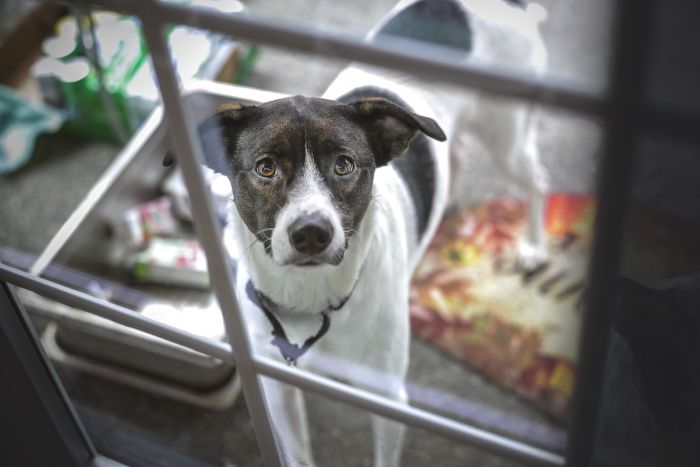
The primary reason this type of gas smells bad is that the bacteria in your dog’s gut are digesting some of the food. The bad odor is caused by the gases these bacteria release as part of their digestive processes.
Fortunately, these types of gas will usually pass within a day or two, assuming you eliminate the cause. But if the super-smelly farts persist, they may indicate a medical problem. This is especially true if they seem to have come from out of nowhere and last for several days or weeks.
What Can I Give My Dog For Gas?
Medications may occasionally be helpful for treating gas that is caused by health problems, so it is important to visit your vet if you suspect that your dog’s gas is caused by a bona fide ailment. However, there aren’t very many medical options available to treat the gas of an otherwise-healthy pup.
Many owners are eager to give their flatulent dog Gas-X (simethicone), but this won’t help.
Gas-X (and similar medications) doesn’t reduce the amount of gas present – it simply helps reduce the pain and discomfort often associated with gas. They accomplish this by accelerating the rate at which tiny gas bubbles in the intestine merge to form big gas bubbles. This makes it easier for your dog’s intestines to expel the gas present.
If you give Gas-X to a dog who is already farting up a storm, it’s just going to make it easier for him to further contaminate the air in your home.
However, Gas-X can be helpful in some cases. For example, it may help provide relief to dogs who are suffering from abdominal pain. It may even help save the lives of dogs experiencing bloat. But you should always contact your vet before administering this (or any other) medication to your pet. Gas-X is dangerous for some dogs, including many collies and other herding breeds.
But while there aren’t many medical solutions to the stinky gas caused by dietary indiscretions, probiotics may help in some cases.
Probiotics are beneficial bacteria that are thought to help promote proper digestive function. They can also outcompete some of the bacteria in your dog’s GI tract that are producing methane, which will help reduce the amount of gas (and the associated odors) your doggo experiences. As a bonus, probiotics may help address diarrhea and other intestinal problems too.
There are a number of probiotics on the market and picking one from the litany of options can be overwhelming to some owners. But we’re here to help: Just take a look at our comprehensive canine probiotic review, where we whittle things down a bit for you.
Do You Need to Take a Gassy Dog to the Vet?
Gas – even incredibly stinky gas – is rarely cause for concern. Like we said at the outset, all dogs suffer from the occasional bout of flatulence, and some dog breeds are gassier than others. It’s a normal bodily function.
However, in some cases, it may signal the presence of an underlying health problem. There aren’t any clear rules regarding when to seek veterinary attention, so you’ll simply have to use your best judgment and try to act in your dog’s best interest.
To do so, consider the following:
- Has your dog produced always produced foul-smelling gas? If so, it’s unlikely that he’s suffering from a serious health problem. In all likelihood, this kind of gas is the result of a poor diet, frequent treats, or a simple predisposition to produce stinky gas. All dogs are individuals, and some simply appear more likely to stink up your home than others.
- Have you recently switched your dog’s food or started offering a new type of treat? If you change your dog’s diet and he becomes gassy shortly thereafter, you probably don’t need a degree in veterinary medicine to determine the cause.
- Did the gas arise suddenly and without an obvious cause? You probably want to visit the vet if your dog suddenly begins producing foul-smelling gas that lasts for more than a few days. This kind of gas may indicate the presence of an underlying health problem.
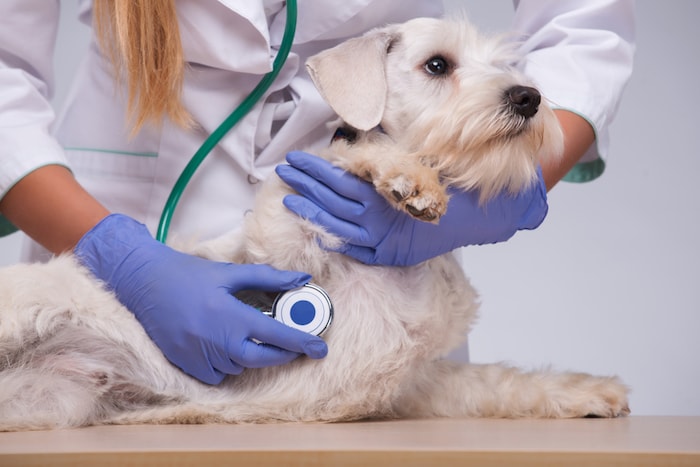
What If My Dog Has Bad Gas and Diarrhea?
If your dog is suffering from constipation or diarrhea in conjunction with the gas, the two symptoms are likely related.
Treat this kind of issue as you would any other minor intestinal problem: Withhold food for about 24 hours and see if the problem resolves on its own.
If the diarrhea or constipation lasts for longer than 48 hours, or your dog exhibits any other troubling signs (such as pain, bloating, fever, or depression) go ahead and visit your vet.
***
Gas is a fact of life for dog owners. You just have to accept the fact that your dog is going to let one rip from time to time. It’s typically no cause for concern. Just be sure to visit your vet if your Spidey sense starts tingling or you suspect that your pup is suffering from an underlying medical condition.
My Rottie can certainly make your eyes water. Fortunately, her farts are usually audible, which is pretty nice, as most dog gas is of the silent-but-deadly variety. If I’m quick, I can usually dive out of the room before I start gasping for breath.
What about your pooch? Do you have a gassy pup? Have you figured out what causes his gas? Have you been able to do anything to limit the amount of gas he produces? Tell us all about your experiences in the comments below!
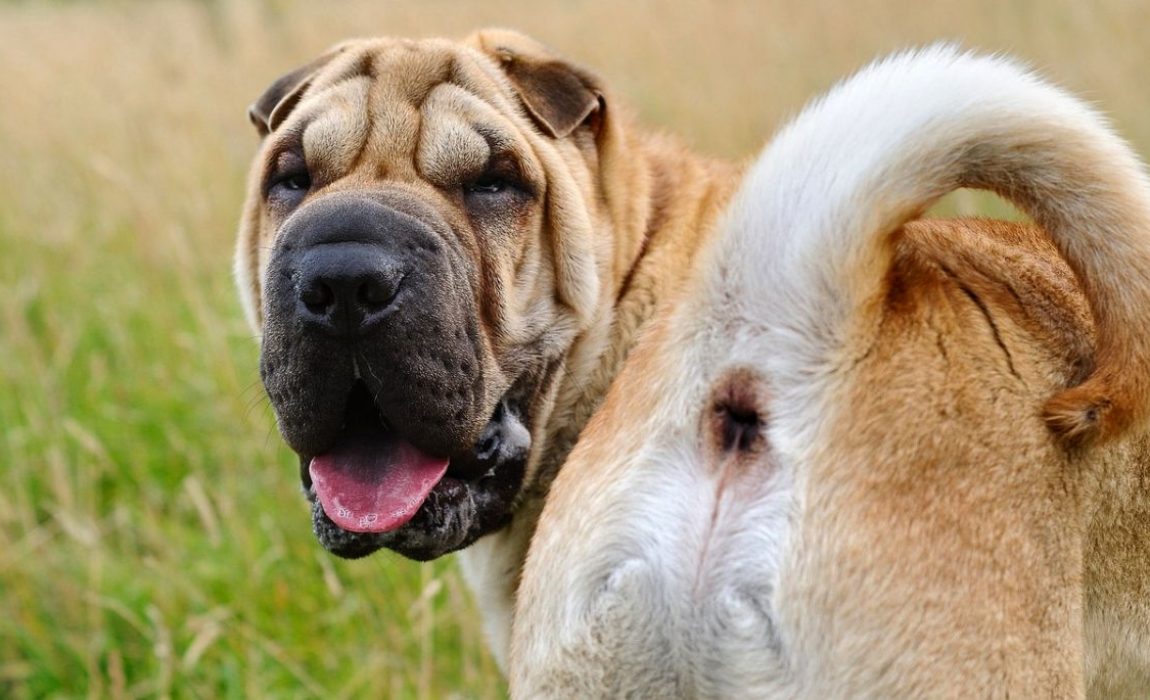

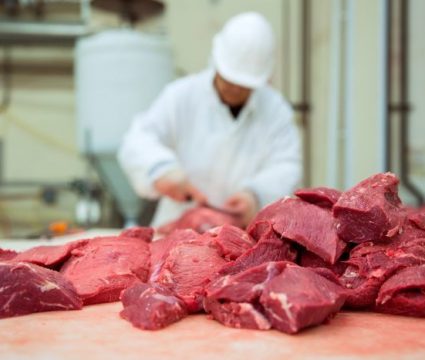



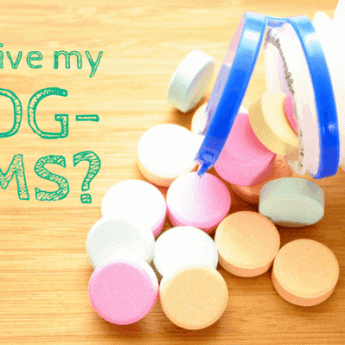
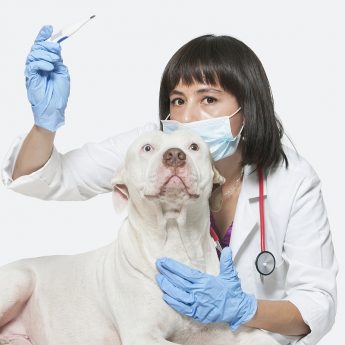
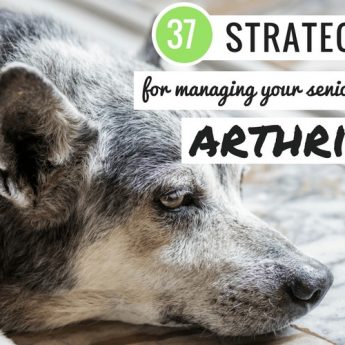
12 Comments
August 7, 2021
My puppy had (has) the worse gas ever. He was a rescue and him and his littermates were found starving. My puppy now has been eating my other dogs poops. I have been intervening in this process but sometimes a poo gets by. When this happens our puppy has the worse gas ever. When I know no poo is consumed he is fine. We are working on this problem daily.
August 9, 2021
Hey, Lori.
That’s certainly not a fun issue to deal with! If you haven’t already, you may want to mention this to your vet just to make sure there’s not an underlying health problem at play too.
Best of luck!
March 2, 2021
Our beloved German shorthair pointer/lab mix, Lucy, has been emitting toxic fart bombs for several months, and I’m sure it’s because she’s been getting too many treats. When I was house training her, she would get a treat for “going” outside. I trained her to ring a bell on the door when she needed to “go.” Well, now she rings the bell to go out, then comes right back in (without actually “going”) and expects a treat! Pretty sneaky, huh? And kind of smart. I don’t buy into this game, but my husband is a sucker for those pleading eyes and gives her treats all day long throughout the day, and it’s just gotten way out of hand. How can I wean her from expecting so many treats, and impress upon him that this is not good for her?
Thanks for any advice you can offer!
Susan Bernardini
March 3, 2021
What a cute story, Susan! Sorry about the “toxic bomb farts,” but we have to admit, sneaky doggos are often adorable.
Honestly, you’re just going to have to be the adult/parent and put your foot down. We know that can be tough when looking into the eyes of your good girl, but it’s for her own good.
One strategy that may be helpful is switching to smaller (or less “potent”) treats. For that matter, you could just break the treats into smaller pieces.
This will help you gradually wean her down, and help her get used to the idea of getting fewer treats.
Best of luck!
February 16, 2021
My Miss B has had “bad gas” for a while now. To the point I now want to try and figure out why.
We are having issues with her getting into our cats dropping. And she likes our cats food. We are trying to brake her.
Any ideas what the problem might be? She is healthy in every other way.
Thanks, Sharon and Miss B
February 17, 2021
Hey there, Sharon.
Your pup’s gas may be caused by her mischievous snacking habits, but we’d recommend starting with a vet visit to rule out any health problems. Once you know she’s healthy, you can try things like using a dog-proof litter box and feeding your cat in an elevated place, which your dog can’t access.
Best of luck!
December 28, 2020
I have a 2yr old chorkie named Marley. Hes been an awesome companion to me. On Christmas morning, I was walking him and his bestie, georgie, when out of nowhere a huge German shepard came dashing toward us with no time to react. Marley slipped out of his collar and ran down the block with the dog on his heels, Marley skidded out on his forehead and he I think he tried to bite or did bite Marley. Hes got small scratches on his back and belly. He yelps whenever you touch that area. No blood was drawn. But ever since then he has had the worst sulfur smelling SPDs ever! Could something have happened internally? He has pooped a few times, but it’s been runny and hard. Should I be concerned.?
January 4, 2021
Hey, Tasha.
That sounds a bit strange. We’d recommend having your vet check Marley out just to be on the safe side.
Best of luck!
August 17, 2020
My dog eats all meat that I cook myself but he has very smelly farts what can I do dog very fussy
August 17, 2020
Hey, Julie.
While we’re glad to hear you’re cooking the meat (as opposed to feeding it raw), your dog needs more than just meat in his diet.
Truthfully, homemade dog foods are typically not advisable unless you select a recipe developed by a canine nutritionist.
We’d recommend switching to a standard kibble (here are some particularly healthy choices). You’ll likely see this clears up some of your dog’s gas.
Best of luck!
March 1, 2020
My Maltese/Bichon cross is now 10 years of age and for the last 7 months or so has bad gas. Two months ago had infected anal glands which are fine now, has also had his blood tests done which are good, but he is terribly fussy with food and I now cannot find anything that he will eat. He has always been a fussy eater, but is far worse now and I really feel at my wit’s end as to what to do. Do hope you can give me some good advice.
Thanking you in anticipation.
Pam Creek
March 1, 2020
Hey Pam – you may want to try a fresh dog good or higher-end food – we have some great picks here in our article on the best dog foods for picky eaters!